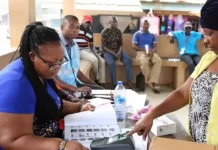
The Institute of Economic Affairs (IEA), a think-tank, has described the nation’s four-year growth rate projection of 5.4 percent as low, and below its potential compared to the various policies outlined in the budget to resuscitate the economy from the impact of COVID-19.
According to the Director of Research at the IEA, Dr. John Kwakye, the ambitious policies outlined in the budget to spur growth require a higher growth rate projection.
Speaking at the Institute’s press briefing on the Mid-Year Budget Review, Dr. Kwakye said: “It has to be said that even though the medium-term forecasts have been affected by initial impacts of the pandemic, the projected aggregate and sectoral growth rates are still quite moderate”.
On the assumption that the pandemic will abate significantly by end of the year – an assumption that is subject to considerable uncertainty, the economy is forecast to rebound from the much-depressed base with aggregate growth estimated to average about 5.4 percent over the medium-term, 2021-24. Agricultural growth is projected to average 4.8 percent during the period; industrial growth, 5.8 percent; and services growth, 5.1 percent.
“At this pace of growth, it will take a much longer time for Ghana to transition into upper-middle-income status. The question that needs to be asked is whether this is Ghana’s potential growth profile. We do not believe that it is. Indeed, Ghana is capable of growing at much higher rates if we beef-up our policies,” he said.
He noted that Coronavirus Alleviation and Revitalisation of Enterprises Support (CARES) programme to be implemented by the government with the aim to recover and grow from the scourge of the Coronavirus pandemic is expected to yield more results during its second phase; therefore, that period should have the country growing higher and faster than what the Finance Minister is anticipating.
“The Budget Review articulates quite comprehensive and far-reaching policies to get the economy back on track under the second phase of the CARES programme. According to the minister, the programme’s main aim is to support the economy to emerge quickly from the pandemic and ensure it is stronger and more resilient.
“This will be in consonance with the president’s Ghana Beyond Aid (GBA) agenda. Appropriately, emphasis is being placed on improving the private sector environment by supporting Ghanaian businesses in targetted sectors: such as light manufacturing, pharmaceuticals, textiles and garments, machine tools, ICT and the digital economy; modernising agriculture through support for commercial farming and attracting the youth into farming, and promoting agro-processing; and supporting AfCFTA with the aim to make Ghana a regional financial, manufacturing and logistics hub.”
Dr. Kwakye added: “The minister also indicated plans to review and optimise implementation of government’s flagship initiatives – including One District, One Factory and Planting for Food and Jobs/Rearing for Food and Jobs, infrastructure projects, and natural resources exploitation.
“This review is in the right direction, as it will provide the opportunity for the government to streamline and improve the initiatives where necessary. These policies, in general, are important for the economy’s immediate resuscitation and long-term growth. However, the fact that, in spite of these policies, the economy is still projected to grow at a moderate pace tells us that we need to do even more.”
BFT


























